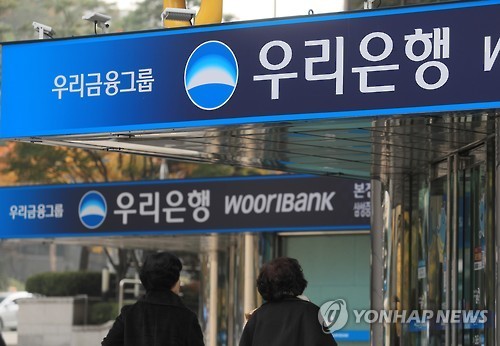The privatization of Woori Bank, South Korea's No. 2 lender by assets, is expected to be completed this week after the state deposit insurer receives a final payment for its sale of a major stake.
The Korea Deposit Insurance Corp. signed a 2.4 trillion-won ($2.06 billion) deal with seven institutional investors on the sale of its 29.7 percent stake in Woori Bank.
 |
This photo, taken on Nov. 13, 2016, shows people passing by the headquarters of Woori Bank in Seoul. (Yonhap) |
The deal calls for IMM Private Equity and Mirae Asset Global Investments Co. to acquire 6 percent and 3.7 percent stakes, respectively. Hanwha Life Insurance Co., Tongyang Life Insurance Co., Eugene Asset Management Co., Korea Investment & Securities Co. and Kiwoom Securities Co. were also each allowed to buy 4 percent stakes.
Six purchasers have already paid for the stakes, while IMM Private Equity paid for a 4 percent interest in Woori Bank to the KDIC with the money for the remaining 2 percent to be paid by Tuesday.
Once IMM Private Equity makes the payment, the purchase of the combined 29.7 percent stake in Woori Bank by the seven investors will be completed.
The privatization of Woori Bank started on Aug. 22, 2016.
In the aftermath of the 1998 Asian financial crisis, the government poured a total of 12.8 trillion won into Woori Bank to keep it afloat, owning a controlling 51 percent stake. With the stake sale, it has so far retrieved 10.6 trillion won, or 83.4 percent, of the taxpayers' money.
The government had tried to sell its stake to private investors, but its efforts failed due to the massive size and a global economic downturn.
Meanwhile, Woori Bank has recently nominated its sitting CEO Lee Kwang-goo for a second term in consideration of the bank's improved earnings and successful privatization under Lee's leadership.
If it's approved by shareholders in March, Lee would become the first CEO of Woori Bank since being privatized after nearly 16 years of efforts. He will lead the bank through March 2019.
Woori's net income is estimated to have increased more than 20 percent on-year to around 1.3 trillion won ($1.1 billion) in 2016, according to local brokerage firms. (Yonhap)







![[Today’s K-pop] Blackpink’s Jennie, Lisa invited to Coachella as solo acts](http://res.heraldm.com/phpwas/restmb_idxmake.php?idx=644&simg=/content/image/2024/11/21/20241121050099_0.jpg)
